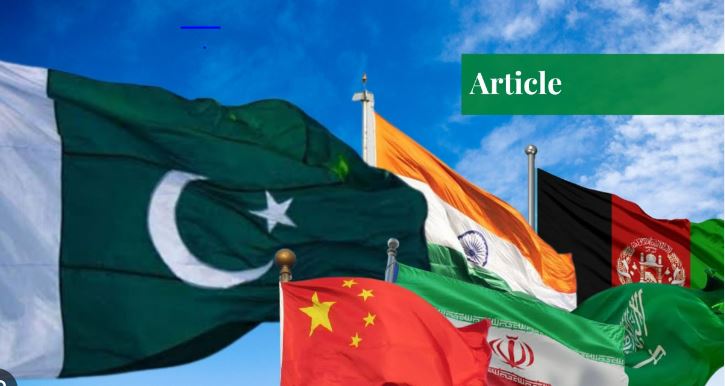
The rise and fall of great powers change is the dynamics of world politics. When the key players in the global system rise or fall, changes occur in the global power structure, players, and interests. So, in Pakistan’s Foreign Policy, continuous tension between old and new emerging players over retention or transition of power. No country can escape this global transformation and power struggle phenomenon.
There has been hardly any period in history to come across where the world has decorated its stage for the performance of major events by the major actors resulting in the upward of the winners and the downward of the losers. The Treaty of Westphalia 1648, gave an end to the thirty-year war of religion and many states succeeded in getting independence. The same initiative also put forward the concept of nation-states, but notwithstanding its contribution to world tranquillity, the trigger of interests kept going on. Early 20th century came across World War 1 along with another trigger which was about to begin right in the middle of the same century-WW2.
After that, the world decorated its stage for the proxy war between two powerful blocks of the world. The new cold war stretched itself to 1991 when it stopped its function with the dissolution of the former USSR into several republics known as CARs. Thus, the world prepared itself to host a single power for the upcoming few years until the time when it stood on the brink of the economic depression in 2008-9, which along with the interventionist nature of the US prompted the resurgence of Russia and the emergence of China. These two joined the US and turned unipolarity into multi-polarity. The US has been trying its best to intact its sole hegemony over the whole globe for a long time.
The USA needs the removal of the two main unacceptable hurdles: China and Russia, from its way to retain its global hegemony. Therefore, the proxy has already started among all these players to have a hold on the International platforms. The Indo-pacific region, the Middle East, etc, are the performing grounds that have been decorated for this preplanned proxy war. It seems quite difficult for countries like Pakistan with an undeniable geostrategic and diplomatic importance, to turn its back on such compulsions generated by recent global or regional developments. In addition to this, Muslim world politics also succeeds in holding its place in Pakistan’s foreign policy.
West region has a trust deficit towards Pakistan being a determinant of its foreign policy is being replied to with the promotion of a soft image of Pakistan via tourism etc. Likewise, the terrorism-caused FATF saga is being wholeheartedly dealt with.
The proxy between the two major powers of the world: China and the US, appeals for Pakistan’s foreign policy to be devised in such a way as to support one of the two players against the other. This demands a balanced approach towards the trigger of the two major powers and Pakistan is leaving no stone unturned to adopt the middle way. This is the only option for Pakistan to have on the diplomatic front. The US tries and will further try its best to contain China so as to hold its head high in the world to have the tag of the sole superpower.
China is, on the other hand, adopting every possible measure to go through this preplanned proxy war successfully. Thus, the stage decorated for this proxy covertly is the Indo-Pacific region: the South China Sea and the Indian Ocean, where both powers have maintained their presence. China has been one of the main uplifters of Pakistan’s sinking economy and a supporter at the diplomatic front: Kashmir and FATF etc.
Similarly, the US is a strategic ally of Pakistan along with its role in boosting Pakistan’s economy and its support for Kashmir and FATF causes though being vital to Pakistan. But this role on behalf of the US does not exist in reality on dint of Indo-US strategic ties to contain China. Keeping all these facts and figures in view, Pakistan cannot suffer by taking a side of either of the two rather it suits well to draw a balanced approach towards the trigger of these two global economic powers.
Thus, Pakistan has succeeded in crafting a balanced policy towards this proxy while keeping intact the same bilateral ties with both countries. Overlooking US’ concerns over CPEC and offering a role of a mediator between the US and Iran etc remained a good step. Likewise, the growing Indo-US nexus is an impediment to Pakistan’s security interests in general and Kashmir’s cause in particular. The Kashmir saga has not been failing in maintaining its place in Pakistan’s foreign policy since 1947 when it turned into a disputed piece of land between Pakistan and India.
Let’s have a look at the Middle East which too has a key role in Pakistan’s foreign policy. The Israel-Palestine conflict has made the region able to experience evergreen unrest in history. Pakistan is supporting Palestine’s case against the illegal settlement of Jews backed by the West in general and by the US in particular to alter the majority proportion. Pakistan has stressed the solution to Syria and Iran-US conflicts through negotiations which have remained the only solution. In Iran -the US tensions Pakistan, despite being a strategic ally of the US and a neighbor and an Islamic counterpart of Iran, has adopted a balanced approach with its emphasis on the solution of the conflict through durable negotiations.
Thus, though being an obstacle to Pakistan’s foreign policy formulators, they have succeeded in striking a balanced foreign posture to a considerable extent.
However, to me, Pakistan has recovered from this blow to some extent on dint of several reasons: both Turkey and Malaysia looking for Pakistan’s consumer market, PM’s recent visit to Malaysia and Turkey’s president taking off to Pakistan along with its position being a sole atomic power in Ummah. Right at this moment when I am writing my view here, Turkey’s President is addressing the joint session of the Pakistani parliament. He is assuring Pakistan of its support of Kashmir’s cause in words,” Kashmir means and matters the same to Turkey as it is to Pakistan.
I think that’s the living posture of Pakistan’s influence on its diplomatic front. Moreover, terrorism has caused irreparable damage to Pakistan in multiple ways. The mismanagement of finance-money laundering, apart from huge damage to various sectors: loss of thousands of people’s lives, and the economy left deteriorated, is detrimental to the national respect on the global front. Pakistan has been placed under a grey list by FATF on dint of poor financial management.
Thus, Pakistan has done its best to act in accordance with the desired advice being given regarding FATF from the concerned. Resultantly Pakistan is out of the grey list thereby avoiding sliding into the blacklist.
The global narrative vis-a-vis Pakistan’s terrorist face is being replaced with the promotion of a soft image via tourism by the recent government. Pakistan has been ranked as the best international holiday destination, according to Conde Nast Traveller, a luxury and lifestyle travel magazine. The UK has changed its travel advisory towards Pakistan followed by the United States of America. It was made possible with the sincere efforts of Pakistan to pose its soft image to the world.
Check Also
Fire Helmets in the U.S. – Traditional vs. European fire helmet (worldrescuers.com)
Thus, terrorism no doubt tarnished Pakistan’s respectful image on the stage of the world theatre, yet it has been dealt with well for the past few moments. Similarly, the role of Pakistan’s sinking economy in its foreign policy is rarely ignored. It would not be out of place to say that it is basically Pakistan’s staggering economy that compels it not to strike a balanced international approach in major dynamics of global power. Let me tell you that Pakistan was in the heart of the KL Summit but in mind with KSA for it was trodden by the timely bailouts flowed by KSA and its allies to aid Pakistan’s sinking economy.
Therefore, in order to avoid such compulsions, Pakistan has adopted harsh and aggressive measures in its economic sphere to boost its economic strength. Apart from this, it has signed a free trade agreement with China to avail of Chinese markets. CPEC is an undeniable step on the economic side which is said to have been for the purpose of meeting Pakistan’s energy shortage, unemployment, infrastructure, etc. KSA’s investment in CPEC is remarkable.
Thus, Pakistan is doing its best on its economic front to boost it up thereby playing its desired role in world affairs. In a nutshell, it is not okay to say that a country like Pakistan with its geostrategic and diplomatic credibilities will escape from the security and diplomatic pressure caused by the events occurring around it.
Pakistan is facing the aforementioned challenges to its foreign policy vis-a-vis its security and diplomatic posture and is, if to say, fighting well with all of them. With its balanced approach to the US-China trigger, the role of a mediator between KSA and Iran can hardly be set aside. Pakistan’s efforts for erasing global doubts about its terrorist face and replacing it with the promotion of its soft image via tourism are bearing fruits.
Above all, though challenges might be to its foreign policy, Pakistan is tackling them all to a considerable extent.
Follow us on social media
Source with thanks:https://dailytimes.com.pk/561092/global-power-dynamics-and-pakistans-foreign-policy-2/

Hi, I am John Smit a Captain in Fire Department City of Newyork with over years of experience in the field of Firefighting and HSE. My passion for fire safety started when I was a young boy and witnessed a neighbor’s house go up in flames along with precious lives. Since then, I had dedicated my life to ensuring the safety of buildings, properties, and individuals in case of a fire and medical emergencies.





